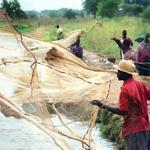Modernisation narratives and small-scale fisheries in Ghana and Zambia
The desire to modernise African small-scale fisheries has persisted since colonial times. In terms of research into and policy on fisheries, mainstream narratives have depicted fishers and fishing communities as the opposite of modern: traditional, overpopulated and guilty of overfishing. Based on existing literature and on empirical research in Ghana and Zambia, this article traces how modernisation narratives have shaped development policies for fisheries post-independence. During the 1950s–1970s, the focus was on technological modernisation so as to promote industrialisation and economic growth. Later, during the 1980s–1990s, in the spirit of democratisation, decentralisation and participation, the focus shifted towards institutional modernisation through co-management policies to prevent unsustainable fishing practices. As shown in the cases of Ghanaís marine fisheries and the Lake Kariba fisheries in Zambia, the various modernisation policies have had very little success. They have failed to recognise that in a context of unemployment, poverty, lack of capital and well-functioning institutions, flexible and low-cost utilisation of fish resources as a source of employment and food security is highly appropriate. Thus, contrary to intentions, modern solutions such as capital-intensive equipment, access regulations and committee participation run the risk of marginalising those who are most in need of fishing for their livelihoods.
https://doi.org/10.1080/08039410.2011.596569


